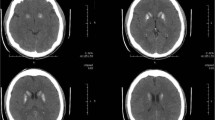Summary
Antidepressant-induced hyponatraemia, while relatively uncommon, is an important clinical problem with serious consequences. Most antidepressants have been associated with hyponatraemia. Although the exact mechanism by which abnormalities of serum sodium level are produced is not known, most of the patients described in case reports meet the accepted criteria for the syndrome of inappropriate antidiuretic hormone secretion. Symptoms of hyponatraemia can mimic depression or psychosis, so awareness of this syndrome and periodic monitoring of serum electrolytes are important for early recognition.
Stopping the medication and assuring normal extracellular fluid volume are the mainstay of treatment; rarely, intravenous infusion of hypertonic saline is required. After correcting the metabolic abnormalities, options for treatment of depression include: rechallenging with the same medication or initiating another antidepressant while carefully monitoring serum sodium level, or considering electroconvulsive therapy, if warranted by the clinical condition.
Similar content being viewed by others
References
Anderson RJ, Chung HM, Kluge R, et al. Hyponatremia: a prospective analysis of its epidemiology and the pathogenic role of vasopressin. Ann Intern Med 1985; 102: 164–8
Emsley RA, Vandermeer H, Alabers C, et al. Inappropriate antidiuretic state in long-term psychiatric inpatients. S Afr Med J 1990; 77: 307–8
Sunderam SG, Mankikar GD. Hyponatraemia in the elderly. Age Ageing 1983; 12: 77–80
Moses AM, Miller M. Drug-induced dilutional hyponatremia. N Engl J Med 1974; 291: 1234–9
Luzecky MH, Burman KD, Schultz ER. The syndrome of inappropriate secretion of antidiuretic hormone associated with amitriptyline administration. South Med J 1974; 67: 495–7
Sandifer MG. Hyponatremia due to psychotropic drugs. Clin Psychiatr 1983; 44: 301–3
Berl T, Schrier RW. Disorders of water metabolism. In: Schrier RW, editor. Renal and electrolyte disorders. Boston: Little, Brown and Company, 1992: 1–87
Berl T. Psychosis and water balance. N Engl J Med 1988; 318: 441–2
Goldman MB, Luchins DJ, Robertson GL. Mechanisms of altered water metabolism in psychotic patients with polydipsia and hyponatremia. N Engl J Med 1988; 318: 397–403
Schwartz WB, Bennett W, Curelop S, et al. A syndrome of renal sodium loss and hyponatremia resulting from inappropriate secretion of antidiuretic hormone. Am J Med 1957; 23: 529–42
Bartter FC, Schwartz WB. The syndrome of inappropriate secretion of antidiuretic hormone. Am J Med 1967; 42: 790–806
Lewis WH. Iatrogenic psychotic depressive reaction in hypertensive patients. Am J Psychiatry 1971; 127: 152–3
Bhargava KP, Kulshreshtha VK, Srivastive YP. Central cholinergic and adrenergic mechanism in the release of antidiuretic hormone. Br J Pharmacol 1972; 44: 617–27
Gipson WT, Price TRP. Inappropriate ADH secretion in a psychiatric setting. Psychiatr Opin 1978; 15(7): 43–6
Seigler EL, Tamres D, Berlin JA, et al. Risk factors for the development of hyponatremia in psychiatric inpatients. Arch Intern Med 1995; 155: 953–7
Kazal Jr LA, Hall DL, Miller LG. Fluoxetine induced SIADH: a geriatric occurrence? J Fam Pract 1993; 36(3): 341–3
Berl T. Treating hyponatremia: what is all the controversy about? Ann Intern Med 1990; 113: 417–9
Weitzel WD, Shraberg D, Work J. Inappropriate ADH secretion: the role of drug rechallenge. Psychosomatics 1980; 21: 771–9
Parker WA. Imipramine induced syndrome of inappropriate antidiuretic hormone secretion. Drug Intell Clin Pharm 1984; 18: 890–4
Mitsch RA, Lee AK. Syndrome of inappropriate antidiuretic hormone with imipramine. Drug Intell Clin Pharm 1986; 20: 787–9
Abbott R. Hyponatremia due to antidepressant medications. Ann Emerg Med 1983; 12: 708–10
Gipson WT, Price TRP. Inappropriate ADH secretion in a psychiatric setting. Psychiatr Opin 1978; 15: 43–6
Narang RL, Chaudhury RR, Wig NN. Effect of electroconvulsive therapy on the antidiuretic hormone level in the plasma of schizophrenic patients. Indian J Med Res 1973; 61: 766–70
Greer RA, Stewart RB. Hyponatremia and ECT [letter]. Am J Psychiatry 1993; 150(8): 1272
Cohen BJ, Mahelsky M, Adler L. More cases of SIADH with fluoxetine. Am J Psychiatry 1990; 147(7): 948–9
Brent R, Chordroff C. ECT as a possible treatment for SIADH: case report. J Clin Psychiatry 1982; 43: 73–4
Author information
Authors and Affiliations
Rights and permissions
About this article
Cite this article
Sharma, H., Pompei, P. Antidepressant-Induced Hyponatraemia in the Aged. Drugs & Aging 8, 430–435 (1996). https://doi.org/10.2165/00002512-199608060-00004
Published:
Issue Date:
DOI: https://doi.org/10.2165/00002512-199608060-00004




